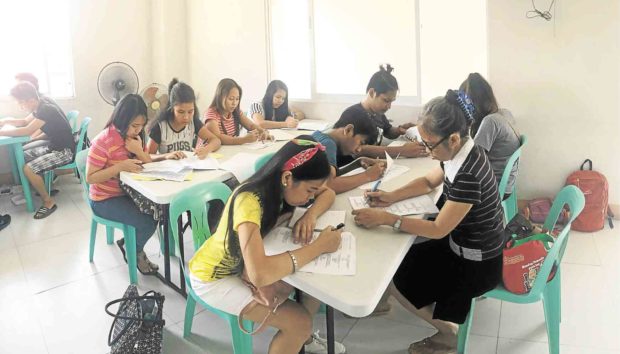Valenzuela youths top targets of ‘Oplan Tokbuk’

Valenzuela City’s “Oplan Tokbuk” comes complete with a mascot to draw crowds and encourage enrollees, then settles into the more serious business of helping out-of-school youths resume their studies and earn an elementary or high school diploma.—PHOTO COURTESY OF CHAREE PINEDA
At the time of “Oplan Tokhang,” in slum areas where a surprise visit from the authorities can put members of the household on edge, civic-minded residents of Valenzuela City have put a friendlier spin on the catchily phrased but controversial police initiative.
Here, they also knock on doors and go house-to-house, but as special agents of “Oplan Tokbuk,” a project that encourages out-of-school youths (OSYs) and adult learners — grownups who wish to catch up on their studies — to once again pick up a book, pen and paper.
Instead of police officers, Oplan Tokbuk’s targets have city officials and teachers showing up at their doorstep. During one promotional activity, the home visits came complete with a marching band and a dancing book mascot.
Launched in November 2016, it aims to attract more residents to avail themselves of the city’s Alternative Learning System (ALS) program, which is designed for those who wish to resume their education but could not reenroll as regular students due to financial reasons and other personal reasons.
On Tokbuk’s hit list was “Grace,” 18, who quit ninth grade three years ago after getting pregnant at 15. A consistent honor student, she not only had to bid goodbye to her stellar academic record, but also face a terrifying prospect alone: raising a baby.
“I felt like my life came to a full stop,” Grace told the Inquirer in an interview. “When they knocked on our door, I knew immediately that I wanted in. Now I’m just happy to be learning again. I felt hope that I could fully get back on my feet.”
Tokbuk actually stands for “Project Katok para sa Magandang Bukas (Knock for a Brighter Future),” which deliberately tries to sound like and mimics the approach used in the Philippine National Police’s Oplan Tokhang, where officers knock on the doors of suspected drug offenders to ask them to surrender and undergo rehabilitation.
Funny reactions
The similarities, of course, end there.
“Sometimes we’d get funny reactions from people. When we arrive at the homes, they would ask, ‘Tokhang ba ’yan?’” said Charee Pineda, a city councilor and lead implementing officer of the project. “We would say, no, it’s Tokbuk. But it’s unlikely you’d confuse Tokbuk with Tokhang. After all, we’re bringing new life and energy to the homes of those we visit.”
Under Tokbuk, she said, the city seeks out OSYs so they can enroll in a 10-month intensive course under their respective barangays. Completing the program will allow them to take the Department of Education’s accreditation and equivalency (A&E) test, which, if passed, earns them an elementary or high school diploma.
Since its launch, Tokbuk has helped some 3,500 OSYs and adult learners, and has tapped 73 teachers and instructional managers (IMs) for the project. Around 1,400 students are expected to take the A&E test this March.
Data from 2016 shows that the city is home to at least 7,500 documented OSYs. “We were surprised because over the years, we have erected at least one public school in each of Valenzuela’s 33 barangays to make sure that every child could go to school. [But] when we saw the data, we realized we had beefed up our formal schooling system; our ALS program was still lacking,” Pineda said.
Through Tokbuk, the councilor said, the city can ensure that everyone has equal access to education, especially those who cannot afford formal schooling. “We want to give them a chance to graduate even if it takes longer than usual. Finishing school and earning a diploma gives our youth a better fighting chance to be employed and have a better future.”
4-hour classes
The prospect convinced Grace, who dreamed of becoming an accountant, to start getting back on track with her education. “It’s even more important for me to finish now especially since I have a (3-year-old) son,” she said. “I want to graduate so I could provide for his future.”
Grace enrolled in the program in May 2017 and has since been attending four-hour classes—covering mathematics, science, English, Filipino and social studies—at the Paso de Blas Barangay Hall from Monday to Friday. The city government provides students with school supplies and free meals every day to motivate them to complete the program.
Despite missing school for three years, Grace again consistently ranks among the top performing ALS students in the city. In a recent citywide test designed as a preparation for the upcoming A&E in March, she placed third out of the city’s 496 examinees, with a score of 214 out of 300.
“She’s a bright young girl and she works really hard,” said Nerisa Aldava, one of her IMs. “We’re confident that, once she completes the program, she will flourish in whatever school she chooses to enroll in.”
The teenager attributed her achievements to her desire to learn and to prove herself capable. “I wanted to disprove the notion that just because you once lost your way, it already spells the end. You can still get back on your feet and excel. Just never give up.”
Labor of love
Still, there are some Tokbuk students who were unable to complete the program due to various factors.
“One of the toughest parts of the job is making sure the students stay on the program,” said Kristine Norman, one of the IMs for Barangay Karuhatan. “Sometimes you have to personally fetch them from their homes to make sure they attend class regularly.”
Together with a fellow teacher Cecile Calata, Norman currently handles 40 students, including adults who need to divide their time between their class and their jobs.
Two mentors are casual employees of the city government, but receive no extra compensation for work done beyond Tokbuk class hours, like visiting the students in their homes to personally monitor if they’re doing their homework and provide some counseling.
“It’s a difficult job,” Norman said. “But at the end of the day, there is great pride in being part of their journey, in having a hand in their success. That’s why we do what we can to make sure they stay with us.”















